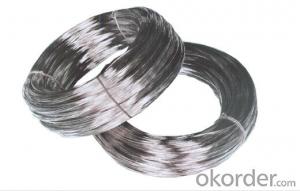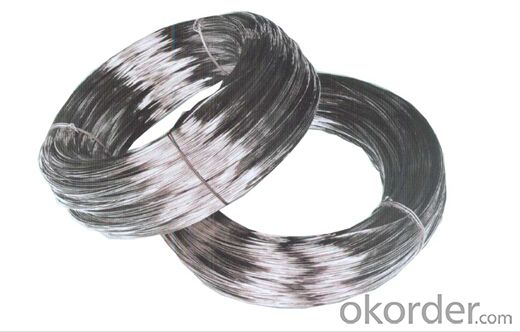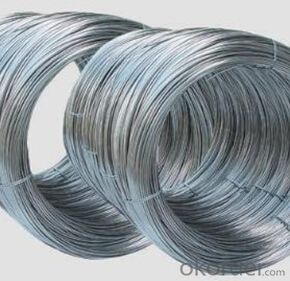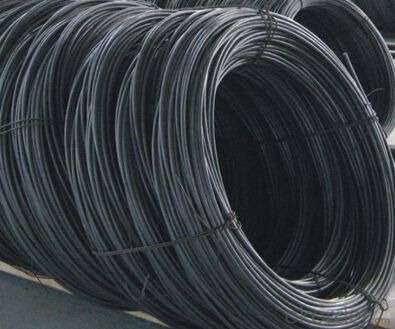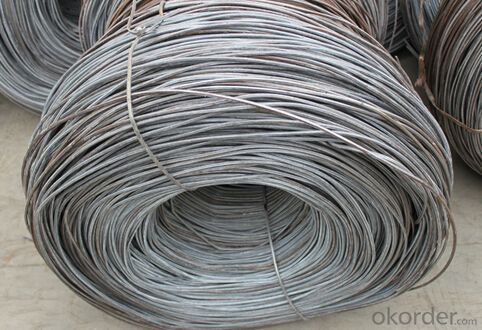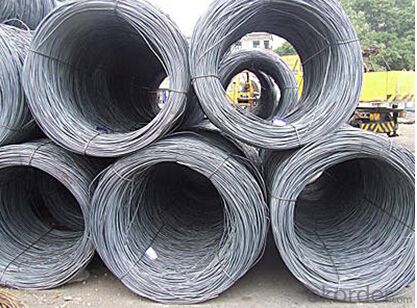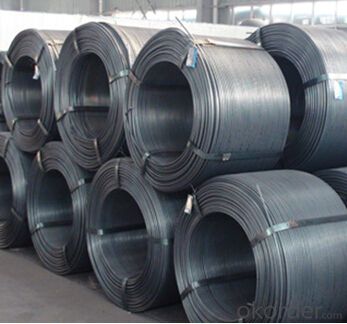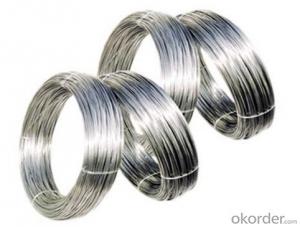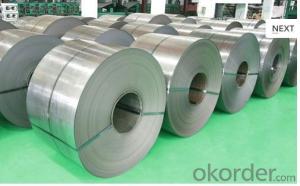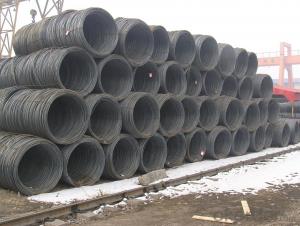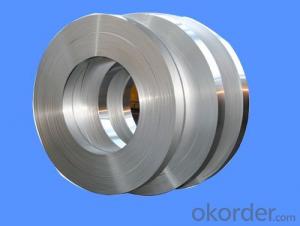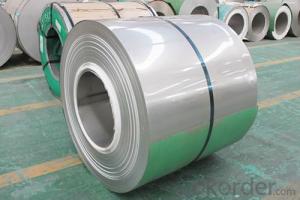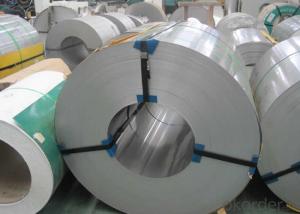Hot-rolled 430 Stainless Steel Wire Rod in Coils
- Loading Port:
- Tianjin
- Payment Terms:
- TT OR LC
- Min Order Qty:
- 1 m.t.
- Supply Capability:
- 10000 m.t./month
OKorder Service Pledge
Quality Product, Order Online Tracking, Timely Delivery
OKorder Financial Service
Credit Rating, Credit Services, Credit Purchasing
You Might Also Like
Specification
Type:
Carbon Steel,Spring Steel,Bearing Steel,Gear Steel,Deformed Steel,Stainless Steel,Alloy Steel
Shape:
Steel Coil,Steel Sheet,Steel Wire Rod,Steel Flat Bar,Steel Square Bar,Steel Angle,Steel Round Bar,Steel Billets
Technique:
Hot Rolled,Cold Rolled,Cold Drawn,ERW,Forged,Saw,Extruded,EFW,Spring
Surface Treatment:
Galvanized,Coated,Copper Coated,Color Coated,Oiled,Dry,Chromed Passivation,Polished,Bright,Black,PVDF Coated
Certification:
ISO,SGS,BV,IBR,RoHS,CE,API,BSI,UL
Thickness:
5.5mm-18mm
Width:
5.5mm-18mm
Length:
In coils
Outer Diameter:
5.5mm-18mm
Net Weight:
2m.t.
Packaging:
Seaworthy packaging
Hot-rolled 430 Stainless Steel Wire Rod in Coils
Detailed Information of the Hot-rolled 430 Stainless Steel Wire Rod in Coils
| Name | Hot Rolled High Carbon Wire Rod |
| Shape | Round Bar/Square Bar/Flat Bar/Plate/Wire |
| Standard | GB/ASTM/SAE/AISI/DIN/JIS/EN/BS |
| Surface Treatment: | Black/Peeling/Polished/Machined |
| Delivery Condition: | Hot Rolled or Forged/Peeled or Black Surface |
| Test | SGS/UT 100% Elements Testing |
| Certificate: | ISO/Mill Certificate |
| Service: | 24 hours online service / |
| more than 20 years trading and manufacture | |
| Quality Assurance: | the third party inspection, such as SGS, BV, TUV…etc. is acceptable |
| Packaging Details: | Seaworthy Packaging or as per customer's packing instruction |
Chemical Composition of the Hot-rolled 430 Stainless Steel Wire Rod in Coils
| Material | C %(≤) | Mn % (≤) | P % (≤) | S % (≤) | Si % (≤) | Cr% (≤) |
| 430 | 0.08 | 1 | 0.04 | 0.03 | 1 | 16.00-18.00 |
Company Introduction theHot-rolled 430 Stainless Steel Wire Rod in Coils
CNBM International Corporation is the most import and export platform of CNBM group(China National Building Material Group Corporation) ,which is a state-owned enterprise, ranked in 270th of Fortune Global 500 in 2015.
With its advantages, CNBM International are mainly concentrate on Cement, Glass, Iron and Steel, Ceramics industries and devotes herself for supplying high quality series of refractories as well as technical consultancies and logistics solution.
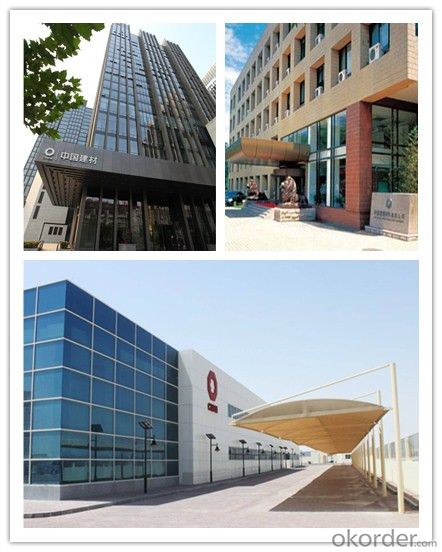
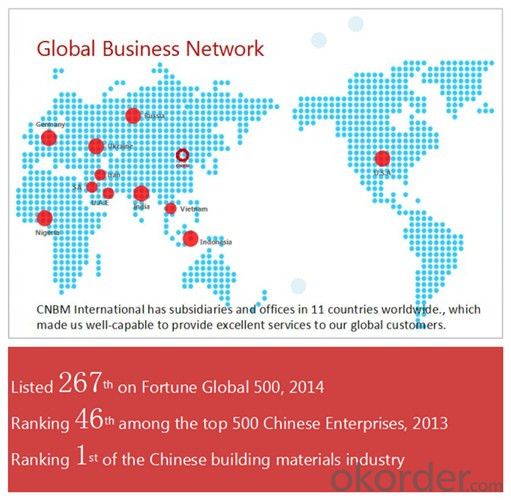
| After-sale service | CNBM provides the services and support you need for every step of our cooperation. We’re the business partners you can trust; you can relax and get on with doing business. |
| For any problem, please kindly contact us at any your convenient time, we’ll reply you in our first priority within 24 hours | |
| Advantages | Industry experience over 20 years. |
| Shipment of goods -More than 70 countries worldwide. | |
| The most convenient transport and prompt delivery. | |
| Competitive price with best service. | |
| High technical production line with top quality products. | |
| High reputation based on best quality products. |
Packaging & Delivery the Hot-rolled 430 Stainless Steel Wire Rod in Coils
| Packaging Detail | Sea worthy packing /as per customer's packing instruction |
| Delivery Detail | 15 ~ 40 days after receiving the deposit |
Products Show
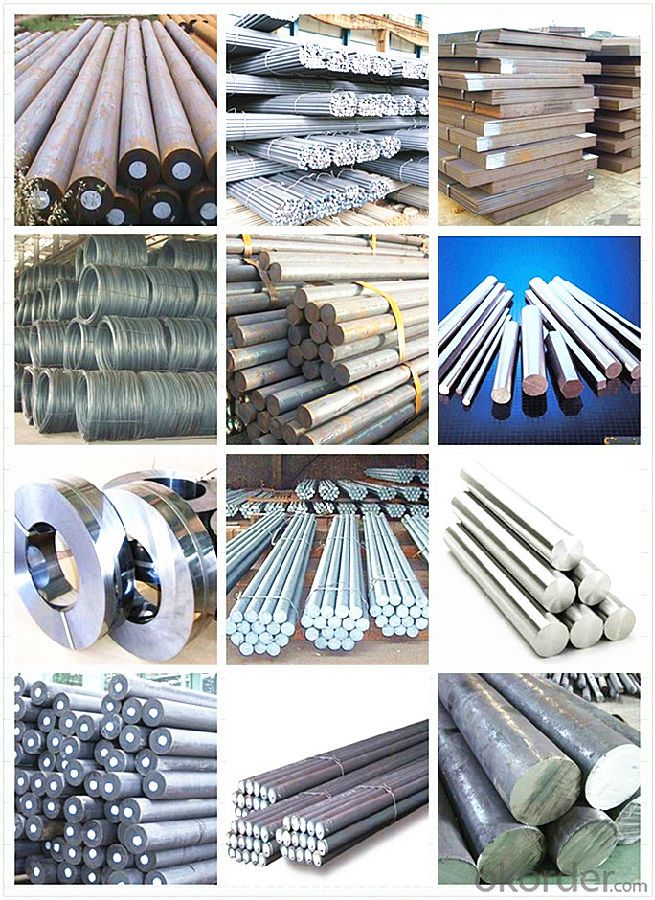
FAQ:
| Are you a trader or manufacturer? | Manufacturer |
| What’s the MOQ? | 3 metric ton |
| What’s your delivery time? | 15-35 days after downpayment received |
| Do you Accept OEM service? | Yes |
| what’s your delivery terms? | FOB/CFR/CIF |
| What's the Payment Terms? | 30% as deposit,70% before shipment by T/T |
| Western Union acceptable for small amount. | |
| L/C acceptable for large amount. | |
| Scrow ,Paybal,Alipay are also ok | |
| Why choose us? | Chose happens because of quality, then price, We can give you both. |
| Additionally, we can also offer professional products inquiry, products knowledge train (for agents), smooth goods delivery, excellent customer solution proposals. | |
| What's your available port of Shipment? | Main Port, China |
| What’s your featured services? | Our service formula: good quality+ good price+ good service=customer's trust |
| Where are your Market? | Covering more than 160 countries in the world |
- Q: How does special steel contribute to the renewable energy industry?
- Special steel contributes to the renewable energy industry by enabling the development and growth of various renewable energy technologies. Its exceptional strength, durability, and resistance to corrosion make it an essential material for manufacturing wind turbines, solar panels, and hydroelectric power plants. Special steel components withstand the harsh environmental conditions in these renewable energy systems, ensuring their reliability and longevity. Additionally, special steel's high magnetic permeability is crucial for the construction of transformers and generators, essential components in renewable energy infrastructure. In summary, special steel plays a vital role in supporting the renewable energy industry's expansion and sustainability.
- Q: What are the different methods of surface honing for special steel?
- Surface honing for special steel can be achieved through various methods, each with its own benefits and uses. Among the commonly employed techniques are: 1. Manual Honing: This approach entails the utilization of handheld honing tools, such as stones, sticks, or abrasive pads, to manually remove material from the steel's surface. Manual honing permits meticulous control and is often suitable for smaller or intricate components. 2. Machine Honing: Machine honing involves the use of specialized honing machines that automate the honing process. These machines typically feature rotating honing stones or abrasive belts, which eliminate material from the steel's surface. Machine honing is favored for larger or complex parts, as it ensures consistent and high-quality outcomes. 3. Diamond Honing: Diamond honing relies on diamond abrasives to eradicate material from the special steel's surface. Given that diamond is one of the hardest substances known, it is exceptionally effective for honing steel. This method is commonly employed in high-precision applications or instances where an exceedingly smooth surface finish is required. 4. Superfinishing: Superfinishing is a specialized honing process that achieves extremely fine surface finishes on special steel. It combines honing stones and abrasive pastes to remove minuscule amounts of material from the surface. Superfinishing is typically utilized in critical applications where surface roughness and dimensional accuracy are of utmost importance. 5. Lapping: Lapping is a honing method that employs a combination of abrasive particles and a rotating or vibrating tool to eliminate material from the steel's surface. It is particularly suitable for parts necessitating a very flat or parallel surface, such as bearings or sealing surfaces. 6. Electrochemical Honing: Electrochemical honing is a specialized process that employs an electric current to remove material from the special steel's surface. It is often employed for intricate or hard-to-reach surfaces, as it effectively eliminates material from areas inaccessible to other honing methods. To sum up, the various methods of surface honing for special steel encompass manual honing, machine honing, diamond honing, superfinishing, lapping, and electrochemical honing. Each method offers distinct advantages and applications, enabling precise control and the attainment of desired surface finishes and dimensional accuracy for special steel components.
- Q: Can special steel be used in marine applications?
- Yes, special steel can be used in marine applications. Special steel, also known as marine grade steel, is specifically designed to withstand the harsh conditions of marine environments. It possesses qualities such as high corrosion resistance, increased strength, and durability, making it suitable for various marine applications. Special steel is commonly used in the construction of ships, offshore structures, and marine equipment. Its ability to resist corrosion from saltwater, chemicals, and other environmental factors makes it an ideal choice for marine applications. Furthermore, special steel is also used in the production of propellers, shafts, and other components that require high tensile strength and resistance to fatigue. Overall, special steel is a reliable and effective material for marine applications due to its unique properties and ability to withstand the challenges posed by the marine environment.
- Q: How does special steel contribute to energy efficiency?
- Special steel contributes to energy efficiency in several ways. Firstly, special steel alloys are often used in the manufacturing of energy-efficient appliances, such as refrigerators and air conditioners. These steel alloys have enhanced heat transfer properties, allowing for more efficient cooling and heating processes, thereby reducing energy consumption. Secondly, special steel is commonly used in the construction of energy-efficient buildings and infrastructure. Its high strength and durability enable the creation of lightweight and sustainable structures, which require less energy for heating, cooling, and maintenance. Moreover, special steel plays a crucial role in renewable energy technology. It is used in the production of wind turbines, solar panels, and hydroelectric power plants, enhancing their efficiency and overall performance. The unique properties of special steel, such as corrosion resistance and high tensile strength, make it ideal for withstanding harsh environmental conditions and maximizing energy generation. In summary, special steel contributes to energy efficiency by enabling the development of energy-efficient appliances, constructing sustainable buildings, and optimizing renewable energy technologies. Its utilization in various industries helps reduce energy consumption and promote a more sustainable future.
- Q: What are the requirements for special steel used in battery technology?
- To ensure optimal performance and safety, special steel utilized in battery technology must fulfill several requirements. First and foremost, it is imperative that the steel exhibits high corrosion resistance. This is crucial due to the presence of corrosive electrolytes within batteries that can gradually deteriorate the steel. Special steel must possess exceptional resistance to corrosion in order to prevent any chemical reactions that may compromise the battery's integrity and lifespan. Additionally, the steel must possess good mechanical strength to withstand the internal pressures and external forces that batteries encounter during operation and handling. It should be capable of resisting deformation and maintaining its structural integrity, even under high-stress conditions. Furthermore, it is desirable for the special steel to have high thermal conductivity. This is essential for efficient heat dissipation, as overheating can diminish battery performance and potentially lead to safety hazards. Steel with excellent thermal conductivity facilitates effective heat transfer, ensuring that the battery can function within safe temperature limits. Moreover, the steel should exhibit low electrical resistivity to minimize energy losses resulting from electrical resistance. This guarantees efficient energy transfer within the battery and reduces power dissipation, ultimately enhancing overall battery efficiency. In addition, compatibility with other battery materials, such as electrodes, electrolytes, and separators, is crucial. Ensuring compatibility prevents any chemical reactions or detrimental interactions that may jeopardize the battery's performance or lifespan. Finally, in line with the growing emphasis on environmental sustainability, it is increasingly important for special steel used in batteries to be produced using environmentally friendly methods. This entails minimizing the carbon footprint and reducing the consumption of scarce resources. To summarize, special steel utilized in battery technology must possess high corrosion resistance, mechanical strength, thermal conductivity, low electrical resistivity, compatibility with other battery materials, and environmental sustainability. These attributes are necessary to ensure optimal performance and safety in batteries.
- Q: How does special steel contribute to the manufacturing of surgical instruments?
- Special steel, which is also known as stainless steel, plays a vital role in the production of surgical instruments. Its exceptional properties make it an ideal material for manufacturing high-quality surgical instruments used in various medical procedures. To begin with, special steel exhibits a high resistance to corrosion and rust. Surgical instruments are constantly exposed to bodily fluids, sterilization processes, and harsh cleaning agents. The corrosion resistance of special steel guarantees the durability of these instruments, enabling them to withstand repeated use and cleaning without compromising their integrity. Furthermore, special steel possesses excellent strength and hardness characteristics. Surgical instruments must be robust and capable of withstanding the forces and pressures exerted during surgeries. The high strength and hardness of special steel ensure that these instruments retain their shape and sharpness even after multiple uses, minimizing the risk of breakage or deformation during critical procedures. Moreover, special steel is biocompatible, meaning it does not elicit reactions or complications when in contact with bodily tissues or fluids. This is particularly important for surgical instruments that come into direct contact with patients' bodies. The biocompatibility of special steel guarantees that there are no adverse reactions or complications when these instruments are used in surgeries, thereby reducing the risk of infections or other complications. In addition, special steel is highly machinable and can be easily molded into intricate shapes and designs. Surgical instruments require precision and accuracy to effectively fulfill their intended functions. The machinability of special steel allows manufacturers to create complex instruments with fine details and features, ensuring their optimal performance during surgical procedures. Furthermore, special steel can be efficiently sterilized. Sterilization is a critical step in ensuring the safety and effectiveness of surgical instruments. Special steel's ability to withstand high temperatures and various sterilization methods, such as autoclaving or ethylene oxide gas sterilization, makes it an ideal choice of material for surgical instruments. In conclusion, special steel significantly contributes to the manufacturing of surgical instruments due to its corrosion resistance, strength, biocompatibility, machinability, and sterilization capabilities. These properties guarantee that surgical instruments made from special steel are durable, reliable, safe, and effective in medical procedures, ultimately enhancing the success of surgeries and improving patient outcomes.
- Q: How does special steel contribute to the mining aftermarket industry?
- Special steel plays a crucial role in the mining aftermarket industry by offering enhanced durability, strength, and resistance to extreme conditions. This type of steel is specifically designed to withstand the demanding environments and heavy loads associated with mining operations. In the mining aftermarket industry, special steel is used to manufacture various equipment and components, such as drill bits, cutting tools, crusher parts, and wear plates. These components are subject to intense wear and tear due to the abrasive nature of the materials being mined. Special steel, with its superior hardness and toughness, ensures that these components can withstand the harsh conditions and maintain their performance over an extended period. Furthermore, special steel allows for the development of more efficient and productive mining equipment. By using high-strength steel alloys, manufacturers can design lighter equipment without compromising on strength and durability. This results in increased productivity and reduced operating costs for mining companies. Special steel also contributes to the safety of mining operations. The robustness and reliability of steel components minimize the risk of unexpected failures, which can lead to accidents and downtime. Additionally, special steel can withstand extreme temperatures, corrosion, and other environmental factors commonly encountered in mining, reducing the need for frequent replacements and repairs. In summary, special steel is essential to the mining aftermarket industry as it provides the necessary strength, durability, and resistance to extreme conditions required for mining equipment and components. It enhances productivity, reduces operating costs, and ensures the safety of mining operations, making it a critical material in the mining industry.
- Q: What are the properties of magnetic steel?
- Magnetic steel is characterized by its ability to attract and hold a magnetic field. It is typically a hard and strong material, making it suitable for various applications such as in the production of magnets, electrical transformers, and motors. Magnetic steel also has high permeability, allowing it to efficiently conduct magnetic flux. Additionally, it exhibits good resistance to corrosion, which helps maintain its magnetic properties over time.
- Q: What are the common alloying elements in special steel?
- Some common alloying elements in special steel include chromium, nickel, molybdenum, and vanadium. Chromium is often added to improve the steel's corrosion resistance and enhance its hardness. Nickel is used to increase the steel's toughness and resistance to extreme temperatures. Molybdenum is another element that is frequently added to enhance the steel's strength and improve its resistance to wear and corrosion. Vanadium is known for its ability to increase the steel's hardness and strength, making it suitable for applications that require high durability. These alloying elements are carefully selected and added to special steel to achieve specific properties and meet the unique requirements of various industries such as automotive, aerospace, and construction.
- Q: What are the properties of duplex stainless steel?
- Duplex stainless steel possesses a combination of excellent mechanical properties, including high strength and corrosion resistance. It offers good toughness and ductility, making it suitable for a wide range of applications. Moreover, duplex stainless steel exhibits a higher resistance to stress corrosion cracking and pitting corrosion compared to other types of stainless steel. Additionally, it has a good weldability, enabling it to be easily fabricated and used in various industries such as oil and gas, chemical processing, and marine environments.
Send your message to us
Hot-rolled 430 Stainless Steel Wire Rod in Coils
- Loading Port:
- Tianjin
- Payment Terms:
- TT OR LC
- Min Order Qty:
- 1 m.t.
- Supply Capability:
- 10000 m.t./month
OKorder Service Pledge
Quality Product, Order Online Tracking, Timely Delivery
OKorder Financial Service
Credit Rating, Credit Services, Credit Purchasing
Similar products
Hot products
Hot Searches
Related keywords
